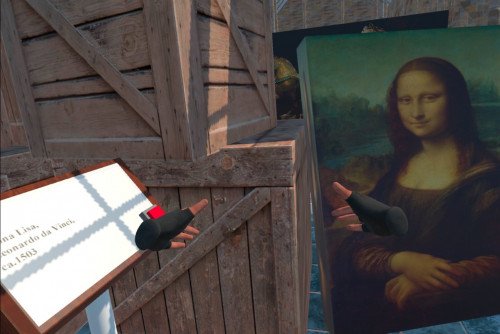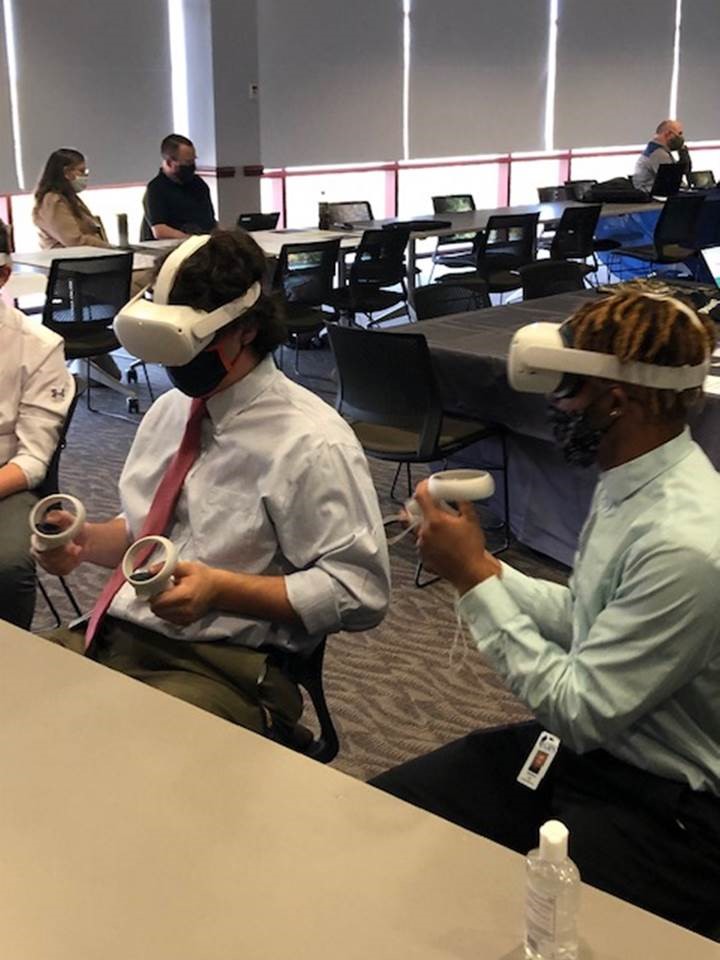
Written by Lead XR Disruptor and Department Head of Art History and Visual Culture, Dr. James Hutson, Associate Dean of the College of Arts and Humanities, Dr. Travis McMaken, and Dean of the College of Arts and Humanities, Dr. Kathi Vosevich.
Lindenwood University, led by the College of Arts and Humanities, has positioned itself as a hub for immersive reality research and innovation. Immersive realities, including Augmented Reality (AR), Virtual Reality (VR), Augmented Virtuality (AV), and Mixed Reality (MxR), have been used in education since the 1990s but have only recently become broadly viable as a consumer technology since the release of the Oculus Quest 2 in 2020. Rather than remaining limited to the realm of pure entertainment in video games, developers have increasingly focused on the potential of educational VR experiences.

Lindenwood’s College of Arts and Humanities Immersive Arts and Culture Hub, which also houses Geographic Information Systems (GIS) and Digital Humanities labs, founded the only XR lab in the region in order to provide the most engaging and immersive educational experience possible, as well as prepare students for the future of work. Beginning with the Immersive Reality Adoption and Integration project funded by an internal grant in Spring of 2020, VR Champions across all academic units have been working to ensure integration across the University, implementing innovative educational opportunities for students, and conducting pedagogical research on how best to use VR in the classroom.
The College of Arts and Humanities led the charge in Spring 2021 by integrating VR experiences in all Art History courses, and faculty continue to integrate the technology across academic programs. Dr. Trent Olsen, assistant professor of art history, for instance, has set up immersive activities in all introductory Art History survey courses. Students use both the Oculus Rift and Quest 2 to explore an Egyptian tomb, the ruins of Pompeii, and Notre Dame cathedral. Research studies are carried out each term alongside Dr. James Hutson, department head and lead XR disruptor, to determine the best pedagogical methods for use of VR in classes. In Fall of 2022, Hutson will be working with Dr. Jason Dude Lively, professor in the department of art, production, and design, to launch the first class taught completely in VR. Lindenwood students will consequently be exposed to the metaverse and prepared for the future of learning and their careers as part of their First-Year Experience.
In the College of Science, Technology, and Health, Dr. Darrell DeMartino, associate professor of nursing, uses VRPatients in the Paramedicine program, allowing for virtual simulation scenarios and the ability to build their own patient editor. Using VR technology to provide high-impact but low-risk training allows students to learn how to save lives and triage in real-world scenarios, giving them the kind of real experience that leads to real success. Dr. Stephanie Afful, associate professor of psychology, and Hutson are also using implicit bias simulations for Social Psychology students to research if those experiences improve self-awareness on the standard instruments to identify bias.
The College of Education and Human Services’ Center for Innovation & Insight, under the direction of Dr. Lynda Levitt, professor of educational leadership, is also moving conferences into the metaverse using Horizon Workrooms. Presenters and attendees anywhere in the world can be in the same simulated space, present their research, and even collaborate by drawing on blackboards together. The center supports the creative process and organizational application of generating, developing, and communicating transformational ideas.
The Plaster College of Business and Entrepreneurship is also integrating VR in their coursework. Dr. Kyle Coble, associate professor of marketing, has students write a paper on how immersive realities impact social media marketing strategies. VR and AR are increasingly the focus of firms seeking to navigate the future of social media. As such, Coble has students research the frontier of this new modality.
These representative examples show how the Immersive Arts and Culture Hub in Lindenwood University’s College of Arts and Humanities keeps Lindenwood on the cutting edge for XR technology and helps ensure that Lindenwood students have the real experience and real success across the university to prepare them for any future.












